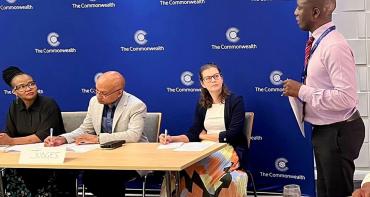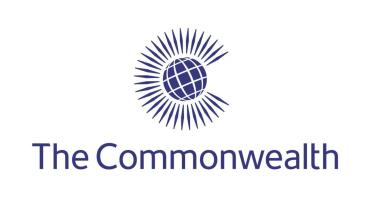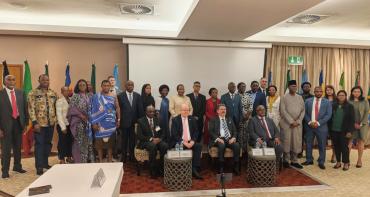Anti-corruption and asset recovery efforts by agencies in Africa have been praised by the Commonwealth Secretary-General.

Anti-corruption and asset recovery efforts by agencies in Africa have been praised by the Commonwealth Secretary-General.
But Patricia Scotland also warned that Covid-19 is making the threat from the “invisible infection” of corruption even more acute.
Cost of corruption in Africa
Addressing the Virtual Commonwealth Regional Meeting of Anti-Corruption Agencies in Africa, the Secretary-General highlighted that corruption already costs Africa an estimated $148 billion per year.
She added: “Much like the coronavirus, the corruption virus strikes with no regard for borders, race, politics, or religion.
“And, like the illness that countries are so desperately battling, corruption causes a huge human and financial cost, putting the most vulnerable at risk.
“We can expect that fraud, bribery, theft, and other criminal practices will rise as people seek to exploit this terrible situation for their own immoral gain.”
Secretariat engagement and support
The Association of Anti-Corruption Agencies in Commonwealth Africa was set up by the Commonwealth Secretariat in 2011 to build on longstanding engagement and support to member countries, And the Commonwealth Africa Anti-Corruption Centre was established in Botswana in 2013.
These developments have yielded positive results, with Commonwealth countries in Africa perceived as less corrupt than non-Commonwealth countries based on Corrupt Perceptions Index scores as assessed by Transparency International. This recognition is confirmed by the continuing high placings Commonwealth countries achieve in the Mo Ibrahim Index of African Governance.
Major impediment to the SDGs
With corruption having a huge global cost of at least $2.6 trillion and being one of the major impediments to achieving the Sustainable Development Goals, the Secretary-General confirmed the Commonwealth Secretariat would continue its support to member countries, saying: “I am optimistic that Commonwealth Africa will be turning the tide against corruption with the further progress you are making through the work of your anti-corruption agencies.
“What is required is for each and every one of us to take swift and decisive action to implement the lessons learnt, fight impunity and improve transparency and accountability.
“Decisive and heroic action is the only way forward, and one day, not too distant from today, Africa will be able to effectively control corruption.”
Many challenges remain
Samuel De Jaegere, anti-corruption adviser at the United Nations Office on Drugs and Crime, commended work in Africa on improving legislation and institution-building while recognising that many challenges remain. These include the need to improve protection for whistle-blowers and to step up implementation of existing anti-corruption laws to end impunity.
Mr De Jaegere also said that funding for anti-corruption bodies and financial intelligence units is still often insufficient.
This was echoed by Roger Koranteng, adviser and head of Public Sector Governance at the Commonwealth Secretariat.
He said: “There is an urgent call on governments to strengthen and resource anti-corruption bodies to make them fit for purpose, to combat complex and sophisticated corrupt practices in the 21st century.”
Rwanda's perspective
Johnston Busingye, Rwanda’s Minister of Justice and Attorney-General, described his country’s stance in tackling the “man-made disaster” of corruption.
He outlined how it has implemented deterrent strategies, strong institutional frameworks, anti-corruption policy and laws and effective investigation and prosecution.
He said: “These and other efforts have significantly diminished corrupt practices, ensured transparency, increased accountability for public assets and funds, ensured efficient management, reduced corruption crimes and deterred possible offenders.”
Lesotho's perspective
Moses Manyokole, director-general of the Directorate on Corruption and Economic Offence in Lesotho, said his country “has benefitted a lot from the Commonwealth” including training on strategies for anti-corruption agencies.
He praised collective Commonwealth commitment to supporting African member countries shown through establishing the network of national agencies and hosting the annual conference.
He added: “It always provides a platform for discussion and sharing of national experience, and is an opportunity for agencies to strengthen ties, forge partnerships and co-operate."



